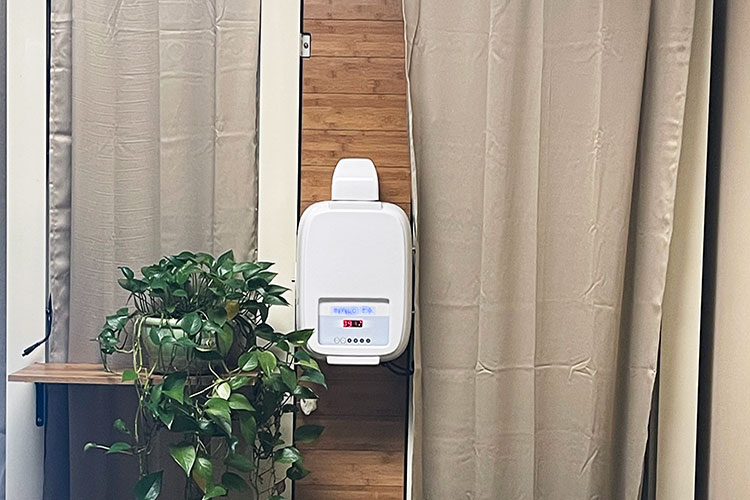How Acupuncture and Natural Remedies Can Prevent Asthma Flare-Ups
Dr. Tatyana's Health and Wellness Blog
Treating the whole person to restore optimal health. Check back often for up-to-date news and information about acupunture and Chinese medicine.
Most Recent Posts ...
Posted on: 5/12/2025
Posted on: 4/28/2025
Posted on: 4/14/2025
Search All Blog Posts
Blog Post Archive Categories
- How Emotional Overload Disrupts Sleep - and How Acupuncture & Neurofeedback Can Help
- Breathe Easier and Feel Better: The Benefits of Salt Room Therapy
- The Hidden Toll of Alcohol: How It Disrupts Sleep, Triggers Anxiety, and Leads to Dependence
- How Acupuncture Can Help Reduce Fear and Anxiety Caused by Stress
- Boosting Metabolism During Menopause: How Acupuncture Can Help
- The Science Behind Acupuncture: How It Works and What Happens in Your Body
- The Hidden Dangers of Overusing Supplements: Are You Taking More Than You Should?
- The Importance of Exercise and How to Stay Motivated for a Healthier You
- The Power Trio: Vitamin D3, Omega-3, and Probiotics - Essential Daily Benefits
How Acupuncture and Natural Remedies Can Prevent Asthma Flare-Ups

Asthma is a chronic condition that affects millions of people worldwide, characterized by inflamed airways, difficulty breathing, and a range of triggers that can cause flare-ups. While conventional medicine provides effective treatments to manage asthma symptoms, many people are seeking complementary approaches to help prevent flare-ups and improve their overall quality of life. Acupuncture and natural remedies have gained popularity as holistic methods that can work alongside traditional treatments to keep asthma under control.
The Role of Acupuncture in Asthma Prevention
Acupuncture, a key component of Traditional Chinese Medicine (TCM), involves the insertion of thin needles into specific points on the body. This practice is believed to restore the balance of energy, or Qi, and promote healing. Here’s how acupuncture can help prevent asthma flare-ups:
1. Balancing the Immune System
Asthma is often linked to an overactive immune response, leading to inflammation and narrowing of the airways. Acupuncture can help regulate the immune system, reducing its hypersensitivity and potentially lowering the frequency of asthma attacks. By balancing the body’s immune response, acupuncture may prevent the triggers that often lead to flare-ups.
2. Reducing Inflammation
Inflammation is a core issue in asthma, causing the airways to swell and constrict. Acupuncture has been shown to reduce inflammatory markers in the body, helping to minimize the inflammation that triggers asthma symptoms. Regular acupuncture sessions can promote a more balanced inflammatory response, making the airways less reactive to common asthma triggers.
3. Enhancing Respiratory Function
Certain acupuncture points are specifically targeted to improve lung function and enhance respiratory capacity. By stimulating these points, acupuncture can support better breathing, reduce the severity of asthma symptoms, and make the airways less prone to constriction during an attack. Improved lung function means that asthma patients can breathe more easily and are less likely to experience flare-ups.
4. Alleviating Stress and Anxiety
Stress is a well-known trigger for asthma attacks. Acupuncture is renowned for its ability to promote relaxation and reduce stress levels, helping to prevent stress-induced asthma flare-ups. By calming the nervous system and promoting a sense of well-being, acupuncture can help asthma patients manage stress more effectively, reducing the likelihood of stress-related symptoms.
Natural Remedies to Support Asthma Management
In addition to acupuncture, there are several natural remedies that can complement your asthma treatment plan. These remedies focus on reducing inflammation, boosting lung health, and preventing triggers that lead to asthma flare-ups.
1. Herbal Supplements
Herbs like butterbur, licorice root, and ginger have anti-inflammatory properties that can help manage asthma symptoms. For example, butterbur is known for its ability to reduce the frequency of asthma attacks, while licorice root supports lung health and reduces inflammation. Always consult with a healthcare provider before adding herbal supplements to your regimen, as they can interact with medications.
2. Dietary Adjustments
Diet plays a significant role in managing asthma. Foods rich in antioxidants, such as fruits and vegetables, can help reduce inflammation in the airways. Omega-3 fatty acids, found in fish oil and flaxseeds, are also known for their anti-inflammatory effects. On the other hand, it’s important to avoid foods that can trigger asthma symptoms, such as processed foods, dairy, and foods high in sulfites.
3. Breathing Exercises
Breathing exercises, such as diaphragmatic breathing and pursed-lip breathing, can help improve lung capacity and reduce the severity of asthma symptoms. These exercises train the respiratory muscles, promote relaxation, and enhance oxygen exchange, making it easier to manage asthma and prevent flare-ups.
4. Essential Oils
Essential oils like eucalyptus, peppermint, and lavender can help open up the airways and reduce symptoms. Eucalyptus oil, for example, has anti-inflammatory properties and can help clear the airways when inhaled. However, it’s crucial to use essential oils with caution, as some people with asthma may be sensitive to strong scents.
Integrating Acupuncture and Natural Remedies into Your Asthma Management Plan
While acupuncture and natural remedies offer promising benefits for preventing asthma flare-ups, they should be used as part of a comprehensive asthma management plan that includes conventional treatments. It’s essential to work closely with your healthcare provider to ensure that these complementary therapies are safe and effective for your specific condition.
Acupuncture and natural remedies can provide a holistic approach to managing asthma, helping to reduce the frequency and severity of flare-ups. By focusing on the root causes of asthma and supporting overall respiratory health, these therapies offer a gentle, natural way to enhance your quality of life and keep asthma under control.
If you're considering acupuncture or natural remedies as part of your asthma management plan, schedule an appointment with us.




